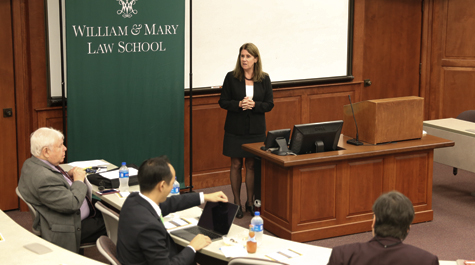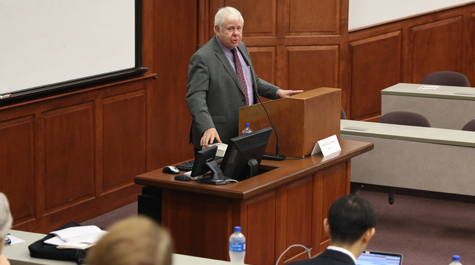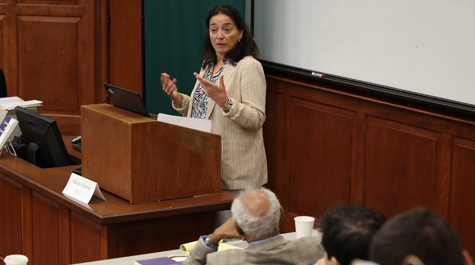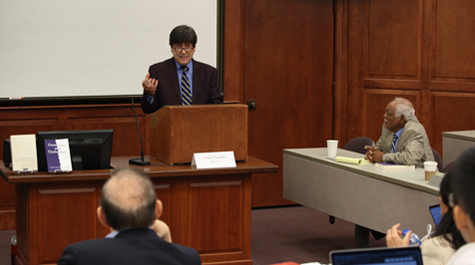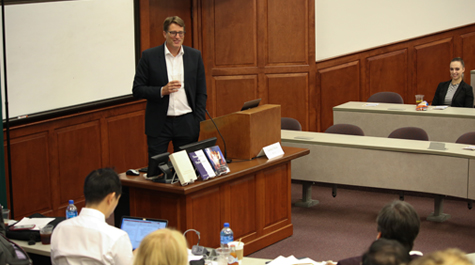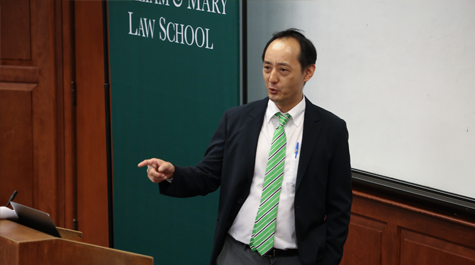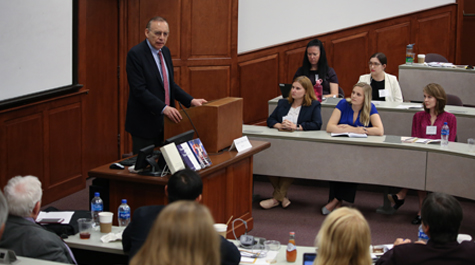Rethinking Constitutions When Democracy Is Under Siege: A Global Perspective
Center for Comparative Legal Studies & Post-Conflict Peacebuilding Hosts Fall Conference
Environmental activist Greta Thunberg strikes to disrupt the system. Hong Kongers celebrate Mid-Autumn Festival with protests and a new anthem. Parliament is prorogued in Great Britain, and allegations are made that the Queen has been lied to. In Italy, politics become personal amid charges that candidates lack dignity and integrity and possess overweening ambition. And in the United States, the Speaker of the House declares that the nation is in a constitutional crisis.
On September 13, constitutional scholars from around the world gathered to debate these and related issues at a symposium sponsored by the Law School’s Center for Comparative Legal Studies & Post-Conflict Peacebuilding (CLS/PCP) and generously supported by the Reves Center for International Affairs. Over the course of eight hours, they considered a range of current events in Europe, Asia, Latin America, West Africa and the United States and debated whether common trends are related and indicative of fractured global democracies – or separate and proof that democracy is alive and well, although restless.
Symposium Chair Professor Christie S. Warren, Director of the CLS/PCP, began with a quote from Justice Stephen Breyer: “Democracy is messy,” and asked speakers about the role of constitutions when protests appear to represent uncontrolled animus and chaos and whether checks and balances against unfettered power are alive and well or missing in action.
Sanford Levinson, W. St. John Garwood and W. St. John Garwood, Jr. Centennial Chair in Law at the University of Texas Law School, had an immediate answer. “Yes, we are in the middle of a constitutional crisis. The constitution is the crisis.” In support of this bold statement, he proposed revisions to our constitutional order in the areas of the electoral college, life tenure for Supreme Court justices, and representation in Congress. Parliamentary systems offer more accessible options for removing executives from power, he said, than presidential systems do since they provide for the availability of no confidence votes. By contrast, impeachment processes have become thoroughly politicized over the years.
Marian Ahumada, Professor of Constitutional Law at the Universidad Autónoma de Madrid, concurred and argued that current social and political events in Spain are directly linked to its post-Franco constitution, which allocated substantial autonomy to the various regions in the country but which may not be enough to hold the country together in the face of a strong separatist movement. “The Spanish constitution was created in a non-inclusive way immediately following the fall of Francisco Franco. It has been disavowed by youth and rejected as a national symbol of oath-taking by various public officials. It is time for a new constitution that reflects Spain as it currently is.”
Louis Aucoin, who has worked on constitutional processes in several West African countries, presented examples of constitutional developments such as land ownership, the role of civil society, and movements to abolish or extend presidential term limits, which appear to be prevalent in many countries in Africa. Surprisingly, he noted, protections for and participation by women in Liberia are especially strong.
Zachary Elkins, Associate Professor of Government at the University of Texas at Austin and Co-Director of the Comparative Constitutions Project, also addressed the persistent problem of executive overstay of term limits in Latin America. He presented a series of data on presidential lawmaking power in the Americas, proposing that executive prerogatives have a strong effect on the ability of executives to pass legislation. Elkins’ analysis of constitutions of the Bolivarian countries of the Andes was especially novel, suggesting that those countries have in fact broken new ground with respect to recognizing new interests and providing new forms of citizen access.
Augusto Lopez-Claros, former Director of the World Bank Global Indicators Group and former Chief Economist and Director of the Global Competitiveness Program for the World Economic Forum, expanded the program’s scope by proposing implementation of opportunities and safeguards in the United Nations Charter that have remained unrealized and which would improve global governance policies. International organizations, he stated, have significant roles to play in supplementing domestic constitutions that may not adequately address issues of importance to today’s youth, including climate change, nuclear proliferation and income disparities.
The symposium’s most lively exchange took place during a presentation by David Law, Sir Y.K. Pao Chair in Public Law at the University of Hong Kong and Chancellor’s Professor at the University of California Irvine School of Law. Analyzing the 1984 Sino-British Joint Declaration and the 1997 Basic Law enacted by the People’s Republic of China to fulfill its treaty obligations, and linking his analysis of current protests in Hong Kong to lessons learned during similar protests in 2014, Law stated that protesters have concluded that they must support each other – whether fellow protesters are violent or non-violent. “Because neither the Hong Kong nor Chinese governments made any concessions at all after the 2014 protests, the protesters this time decided that they must be willing to tolerate violence and remain totally united, no matter what. They expect that the government’s strategy is to try to divide them, and they feel that if they do not win something now, there is no hope for the future.”
Ke Tang, a Visiting Scholar from China who is spending a year at the Law School, vigorously challenged some of Law’s statements during the program but afterwards expressed satisfaction with the symposium and his opportunity to participate. “This conference validated my desire to study in the United States. The opportunity to directly engage with eminent scholars and have my opinions respected and responded to is not easy to find in Chinese universities. Programs in China do not allow sufficient time for scholars to give well-developed presentations that can be endorsed or challenged by audiences. I was deeply impressed by the debate that took place during this symposium.”
Warren also expressed satisfaction with the program. “We are an academic institution, exactly where new ideas should be proposed and different approaches and opinions debated. Universities and law schools are where experience and analysis elevate knowledge and inform policy. We are grateful to have scholars and practitioners of the caliber of these speakers who are willing to share their perspectives with our community.”
About William & Mary Law School
Thomas Jefferson founded William & Mary Law School in 1779 to train leaders for the new nation. Now in its third century, America's oldest law school continues its historic mission of educating citizen lawyers who are prepared both to lead and to serve.



